Henry retired to his seat, obviously exhausted by the passionate working of the Spirit in him. Nothing he had said was wholly unexpected — his audience had heard some of it before from Starky, Thomas, Price and the Belovéd himself — yet an intense murmuring arose and subsided as Starky and Thomas again came forward.
“Our Abode of Love,” Starky announced, “Shall be known as Agapemone .”
“At the back of this hall,” said Thomas, “Brother James Rouse, our attorney, has opened the Book of Mercy where he will register the names of those willing to enter the Agapemone by giving their All to it.”
Said Starky, “Only your intention will be recorded today, as the legal transfer of property to our Abode will take a little longer. I and Brother Thomas will be foremost in setting our names there.”
He and Thomas left the platform together and strode side by side to the back of the hall where Julia, Mrs Starky and Price waited to sign their names.
In Belfield Terrace that evening donations indicated in The Book of Mercy were compared with the estimated costs of the estate. Henry’s seven most faithful followers discussed these while he, wearing quilted dressing gown, velvet smoking cap and slippers, lay back in an armchair and only spoke when a final decision was needed. The book registered the following: –
4 clergymen (not counting Henry) — Thomas, Starky, Price and the Swansea Curate
a civil engineer — William Cobbe
a landed proprietor — Hotham Mayber
a surgeon — Arthur Mayber, Hotham’s brother an attorney — James Rouse
7 fund-holders — 3 Nottidge sisters and Mayber’s 4 sisters
2 annuitants — Julia and a widow called Paterson
3 farmers, 1 with five hundred acres employing thirty labourers
a twelve-year-old girl, the daughter of Mrs Paterson
9 house servants, one of them male
6 laundresses
2 dressmakers
3 helpers in stables
3 carpenters
a mason
a groom
a post-boy
a shoe-maker
a tailor
“An excellent beginning — really excellent,” said Starky, “Though, alas, the All our brothers and sisters are willing to donate is less that the amount our greater Abode requires.”
“Because some are not donating their All, like we in this room!” said Julia sharply, “Our lawyer James Rouse is withholding a very great deal. His income must be much larger than he admits — he says nothing about the savings or the value of his properties. Which of us should speak to him about that?” she asked Henry. He murmured, “Nobody, as yet.”
“It would be unwise to estrange him,” said Mayber, “while he is drawing up deeds of gift for signature by our Belovéd’s other followers.”
“Then what about the Nottidge girls?” demanded Julia, “Each offers the thousand a year interest on her capital, but not the capital itself.”
They glanced toward Henry who said quietly, “Do not worry; the Lord will provide. Show me the plans again please.” Cobbe laid them on his knees saying, “The church at least is completed, apart from the spire.”
“It needs no spire,” said Henry, “It needs, however, a conservatory or at least a corridor joining it to the main residence.”
“What a good idea!” cried Mrs Starky, “Because, you know, we can then go back and forth to divine service quite untroubled by the weather until. . until. . ”
She frowned uncertainly. Thomas suggested, “Until time stops, eternity begins and the weather is as heavenly as God will make it?”
“Yes! That is exactly what I meant.”
“I too look forward to that blesséd day,” said Starky, “though I am sorry for the doomed multitude who will never enjoy it.”
“You should not be sorry, they will have brought it on themselves,” said Julia.
A few weeks later Starky told the Nottidge sisters that the Spirit required them to travel with him, Henry and their wives to view the work going forward at Spaxton. They went by coach into Somerset and stopped in Taunton where the Princes and Starkys rested at Giles’ Hotel, the three spinster ladies at the nearby Castle Inn. Early next day Henry sent for Harriet. She put on her bonnet and crossed to the Giles’ Hotel where he received her kindly but solemnly. In the presence of Julia and the Starkys he explained that it would be for the Glory of God if she married his young friend, the Reverend Lewis Price. Harriet blushed and agreed. Henry bade her return in peace to the Castle Inn and lock this secret closely in her heart. This she did.
Then Henry sent for Agnes, a less biddable woman. In a voice as kind as he had used with her sister but more solemnly he said, “Agnes, God is about to confer on you a special blessing; but ere I tell you what it is, you must give me your word to obey the Lord and accept His gift.”
Agnes gave her word after the slightest of hesitations. Henry said, “In a few days you will be united in marriage to our Brother George Robinson Thomas.”
Agnes, confused by the news, cried out, “In a few days ?”
“Such is God’s will.”
“But — but — but I have relations to consult, legal settlements to make!”
“You need none of these things. You must not think of the world, but of God.”
“But my mother must be told!” Agnes pleaded.
“God is your father and mother,” said Prince.
“But lawyers take time. . ”
“Why do you want a lawyer, dear?” asked Mrs Starky, looking up from her knitting.
“Well. . for the children’s sake.”
“You will have no children!” said Prince, patiently. “Your marriage with our Brother will be spiritual only; your love to your husband will be pure, according to the Will of God. And now,” he added more warmly, “take tea with us, Agnes, and know that this blesséd moment is a happy one.”
Later in the day the two sisters dined with the Princes and Starkys at the Giles’ Hotel where they met their new fiancés, Thomas and Price. Two days later Clara was similarly engaged to William Cobbe. The three sisters now wished to return to their mother’s home in Stoke for a while, but Henry said God forbade that and also forbade them to tell anyone by letter before the marriages. Meanwhile Harriet and Clara willingly signed their fortunes over to Henry. Agnes refused, but finally signed an agreement that her husband Thomas could invest her property in their joint names. All these details were arranged through communal prayers led by Henry. A fortnight later the three marriages were solemnized in Swansea by one of the Brethren, Starky giving the brides away and Henry looking on.
By these means eighteen thousand pounds of Nottidge money was added to the Agapemone fund. Continuous inflation during the twentieth century has made it almost impossible to convert such a sum into a modern equivalent — in those days servants who ate and lodged with a family were often paid a pound a year or less. Postal rates may give another clue. In Victoria’s reign an early Socialist had organized the Royal Mail to deliver any letter in Britain for the price of a penny stamp. It was a first class service — there was no second class. In 2006 a first class stamp costs 33 pence, but multiplying the Nottidge £18,000 by 33 would still be too little, for in Britain’s pre-decimal days a pound contained 240 pence. By a conservative estimate Henry acquired by these three marriages more than a million modern pounds sterling, which was a fraction of what he got from other followers when income tax was so small and such a recent innovation that important statesmen (Gladstone was one) proposed abolishing it. The estate was now perfectly solvent.
Henry called Julia and the Starkys, Thomas and Price, Mayber and Cobbe, “my seven-branched golden candlestick”. One evening, after calculating all the moneys transferred to Henry’s account, an awestruck silence befell them. Mrs Starky broke it by saying, “Well, Belovéd, you must now certainly have your own carriage and pair.”
Читать дальше












